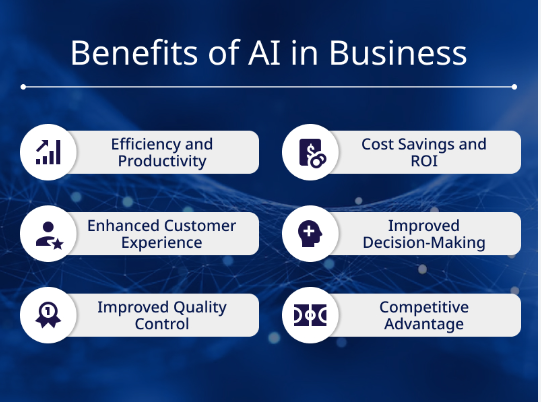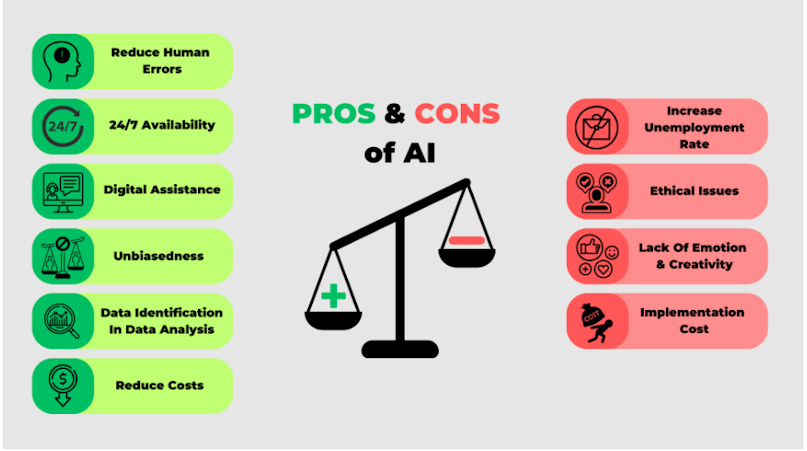In an age where technology continuously reshapes landscapes, how can Artificial Intelligence (AI) be the game-changer for your business?
As companies worldwide embrace AI, they unlock new realms of efficiency, data analysis precision, and customer engagement, promising an era of unparalleled innovation and growth. This transformative technology not only automates routine tasks but also revolutionizes decision-making and market strategies, offering a competitive edge in the global arena.
However, the path to AI integration is strewn with obstacles. Ethical concerns over bias, privacy risks, and the challenges of autonomous decision-making demand careful consideration. Moreover, successful AI deployment necessitates significant investments in both skills development and infrastructure.
Navigating these complexities requires a nuanced understanding of AI's vast potential against its ethical, privacy, and financial implications. Adopting AI with a balanced, strategic approach allows businesses to leverage technological advances responsibly, ensuring operational excellence and long-term success in the digital age.

The Advantages of AI in Business
Increased Efficiency and Productivity
The integration of Artificial Intelligence (AI) into business operations has become a cornerstone for achieving heightened efficiency and productivity across various sectors. This transformative technology has the power to redefine traditional business workflows, making them more streamlined and effective.
By taking over repetitive, mundane tasks, AI allows employees to focus their efforts on areas that necessitate human insight, creativity, and strategic thinking. This shift not only enhances employee satisfaction by alleviating the burden of monotonous work but also significantly boosts overall productivity. AI's transformative potential in business, from automating tasks to reshaping customer interactions and decision-making processes, is explored in depth in Entrepreneur's analysis of AI's pros and cons
AI-powered tools and systems are at the forefront of this revolution, offering solutions that range from automating customer service interactions to optimizing supply chain logistics. In customer service, for example, AI-driven chatbots and virtual assistants can handle a multitude of routine inquiries simultaneously, ensuring quick responses to customer queries while allowing human agents to concentrate on resolving more complex issues that require a personalized touch. This not only improves customer satisfaction but also increases the efficiency of the customer service teams. The significant efficiency gains from AI, particularly in automating mundane tasks, are highlighted in Harvard Business Review's exploration of AI's impact on productivity.
A compelling illustration of AI's impact on efficiency and productivity is evident in the operations of Amazon. The retail behemoth employs sophisticated AI algorithms and robotics in its fulfilment centers to expedite the sorting and delivery of packages. This technological synergy not only shortens the time frame from order placement to delivery but also dramatically reduces the margin for error. Through such applications, AI demonstrates its capability to significantly enhance operational efficiency and productivity in a business context. This evolution underscores the potential of AI to transform the way businesses operate, promising not just incremental improvements but a fundamental shift towards higher efficiency and productivity.
2. Enhanced Accuracy and Decision-Making
Artificial Intelligence (AI) in business has caused an unprecedented revolution in data analysis and decision-making processes. AI excels at combing through vast datasets with unprecedented computational power to uncover actionable insights with unparalleled precision - providing businesses with access to actionable intelligence at scale that enables strategic decisions with reduced margins of error.
AI's predictive analytics capabilities offer businesses an invaluable edge when it comes to staying abreast of market trends, understanding consumer behaviors in-depth, recognizing risks and opportunities, and anticipating market movements with greater precision than traditional forecasting methods.
Machine learning algorithms now enable companies to accurately predict future market movements more accurately than ever before allowing businesses to adjust strategies preemptively according to changing market dynamics ensuring they remain competitive and responsive in today's globalized marketplace. To better understand how to leverage AI for business applications, including decision-making, companies can turn to resources like How to Use ChatGPT-4.
Artificial Intelligence can play an integral role in decision-making processes across various domains, offering tangible advantages in efficiency and strategic positioning. AI algorithms have proven particularly helpful for supply chain management by optimizing logistics and inventory levels while decreasing waste while simultaneously increasing efficiency. Marketing utilizes AI to deliver highly tailored customer experiences and enhance satisfaction and loyalty among their target demographic.
AI can transform decision-making processes across industries and business functions alike, not only increasing operational efficiencies but also equipping them with tools necessary for successfully navigating modern marketplace complexities with agility and confidence. AI data analysis revolutionized business operations while setting new standards of precision and decision-making excellence. The strategic advantages of AI in enhancing data-driven decision-making are underscored in MIT Technology Review's coverage of AI's capabilities
3. Improving Customer Experience
Artificial Intelligence (AI) can have an immense and diverse effect on customer experience, offering unparalleled levels of personalization and real-time support - fundamentally altering how businesses interact with customers. One key benefit of AI lies in personalization: using customer data analysis to tailor products, services, and communications directly to individual preferences - this approach not only ensures customers receive offerings tailored to meet their individual needs and desires but also significantly boosts satisfaction levels and fosters loyalty among existing and new customers alike.
AI's capacity for real-time customer support through chatbots and virtual assistants is revolutionizing customer service. As shown in AI Tools for Recruiting, AI-powered tools can streamline not just customer service processes but also enhance HR operations by handling routine inquiries without human intervention. These AI-powered tools offer instant, 24/7 assistance to customers by answering their queries efficiently and accurately - significantly streamlining customer service processes while elevating service quality, leading to enhanced customer retention rates.
The transformative potential of AI in fostering deeper customer relationships is well illustrated in the discussion on AI UX Design Review. Netflix's use of AI to personalize viewing recommendations has significantly increased user engagement and retention rates, while e-commerce giants leverage it for real-time customer service, cutting down wait times and improving resolution rates - examples that highlight how AI is revolutionizing interactions by offering tailored service at unprecedented speed, making for personalized and efficient customer interactions that set new benchmarks for customer journey. By harnessing such innovation AI is not only improving the customer journey but also building stronger, more meaningful relationships between businesses and their customers.

The Challenges of AI in Business
Privacy and Data Security Concerns
In the era of digital transformation, the integration of Artificial Intelligence (AI) in business operations brings to the fore significant privacy and data security concerns. AI's dependence on extensive customer data for personalization and improved service delivery introduces potential vulnerabilities, from the risk of unauthorized access to the threat of data breaches.
As businesses harness the power of AI, they find themselves at the crossroads of leveraging technology and ensuring the stringent protection of personal information. Navigating the complex landscape of data privacy regulations is crucial for businesses employing AI, a topic further explored in the insights on AI Design Agency services.
Navigating this delicate balance involves adherence to comprehensive data privacy regulations, such as the General Data Protection Regulation (GDPR) in Europe and the California Consumer Privacy Act (CCPA). These laws mandate rigorous data management practices, requiring businesses to obtain clear consent for data collection, ensure transparency in its usage, and implement robust security measures to protect against breaches. Adhering to these regulations is paramount, not just for compliance but as a cornerstone of building and maintaining consumer trust.
Recent high-profile data breaches underline the critical need for advanced security protocols, including encryption and regular security audits, to shield AI systems from threats. Additionally, fostering an organizational culture that prioritizes data privacy and security is vital. Educating employees, stakeholders, and customers about the significance of data protection in AI applications is essential for mitigating risks and cultivating a trusted environment. For businesses, achieving a harmonious balance between harnessing AI's potential and upholding data privacy and security remains a paramount challenge.
2. Understanding AI's Capabilities and Limitations
Grasping the full spectrum of Artificial Intelligence's AI capabilities and limitations is essential for businesses eager to embrace this technology within their operational framework. A prevalent misconception among business leaders is the notion that AI can be a panacea for all organizational challenges, capable of making intricate decisions without human oversight.
While AI indeed possesses the remarkable ability to process and analyze vast datasets and identify patterns with precision far surpassing human capabilities, it inherently lacks the depth of understanding, empathy, and ethical reasoning that human judgment provides. This fundamental distinction underscores the importance of equipping business leaders with a comprehensive understanding of what AI can and cannot do. The significance of educating business leaders on AI's capabilities and limitations is underscored by the insights provided by AI Startups illustrating the landscape's opportunities and challenges
The effective implementation of AI transcends mere technical deployment; it demands a blend of technical acumen and strategic foresight. AI is best utilized as a tool to augment human intelligence, not as a substitute. Leaders who are well-informed about AI's strengths and limitations can craft innovative solutions that enhance operational efficiency and decision-making while maintaining ethical integrity and nurturing human connections.
Moreover, the juxtaposition of AI's analytical prowess with human creativity and ethical consideration fosters an environment where technology and humanity complement rather than compete with each other. By integrating AI with a clear-eyed view of its capabilities and limitations, businesses can navigate the complex landscape of modern technology, ensuring that their use of AI is both responsible and strategically sound. This balanced approach is pivotal in leveraging AI to achieve not only technological advancement but also to uphold the core values that define our shared humanity.
3. Ethical and Employment Considerations
Effectively navigating the ethical and employment ramifications of Artificial Intelligence (AI) integration in businesses requires a comprehensive approach that addresses both the potential biases inherent in AI systems and the impact of automation on the workforce.
A primary concern is the presence of biases in AI algorithms, which, if left unchecked, could perpetuate societal disparities, particularly in sensitive domains like recruitment and financial services. Implementing rigorous bias detection and mitigation protocols is essential to ensure AI operates in a manner that is both fair and equitable. The ethical and employment concerns associated with AI, including bias and job displacement, are critically examined in The Guardian's feature on AI in the workplace.
Equally critical is the discourse on AI's influence on employment, as automation introduces the dual-edged sword of fostering innovation while threatening traditional roles. Transparent AI decision-making processes can demystify the technology for stakeholders, fostering trust and understanding in AI's applications.
Moreover, preparing the workforce for a future intertwined with AI is paramount. Initiatives aimed at re-skilling and up-skilling employees will be crucial in transitioning to a workplace where humans and AI collaborate effectively. Promoting a culture of continuous learning and adaptability ensures that technology enhances rather than displaces human roles.
By prioritizing these strategies and maintaining a steadfast commitment to ethical standards, businesses can leverage AI to augment human work and navigate the complex interplay between technology, ethics, and employment in the AI era.

Implementing AI: Costs vs. Benefits
Bloomberg delves into the financial considerations of adopting AI technologies in business, weighing the costs against potential benefits The Real Cost vs. Benefit Dilemma of AI in Business, both initial investments and ongoing operational expenses. These expenses include purchasing AI software or platforms and integrating them with existing systems; plus potentially hiring specialists to develop, manage, and maintain these technologies. For a deeper understanding of AI's impact across various sectors, AI UX Research Trend provides valuable insights, emphasizing the balance between costs and long-term gains.
AI can automate mundane tasks, streamline operational efficiencies, enhance decision-making through predictive analytics, and personalize customer experiences - leading to cost savings by eliminating manual labor and errors, increasing productivity, and finding new revenue-generation opportunities. AI-powered data analysis may provide insights that lead to more effective marketing strategies and product developments that align with consumer preferences and trends.
Establishing the ideal balance between initial costs and anticipated long-term benefits is of critical importance for businesses. Businesses should take into account not only upfront financial outlays but also how AI could potentially add competitive advantage, market positioning, and financial performance over time. A strategic approach must be taken when deploying AI technologies as this ensures they align with business goals and objectives effectively.
Since AI technology evolves at such a fast rate, investments are not one-time costs but an ongoing commitment. Businesses wishing to invest in AI must adapt quickly to remain ahead of advancements while integrating them into business processes successfully. This dynamic landscape presents both risks and opportunities for those willing to explore this frontier.
As previously discussed, AI technology adoption carries significant financial repercussions; however, the long-term potential gains are impressive. Businesses that strategically implement AI can expect improvements in efficiency, productivity, innovation, and competitiveness that lead to greater competitiveness and profits.
Conclusion and Future Outlook
Is the financial commitment to AI technology worth its potentially transformative impact on businesses? Integrating AI demands not only a significant initial investment in software and platforms but also an ongoing financial commitment to hiring specialists capable of managing these solutions. Despite these costs, AI offers long-term benefits that can redefine business operations. From automating mundane tasks to enhancing decision-making with predictive analytics, AI introduces a new efficiency level, reducing human error and informing strategic moves with unparalleled market foresight.
Moreover, AI enables personalized customer experiences, fostering loyalty and opening new revenue avenues. The challenge lies in balancing the upfront costs against these long-term advantages, considering AI's role in competitive positioning and market differentiation. The rapid evolution of AI technology requires businesses to stay agile, continuously adapting to integrate new advancements. While the initial financial outlay is considerable, the prospects for efficiency, productivity, and innovation make a compelling case for AI's strategic implementation in achieving a competitive edge and enhancing profitability.




